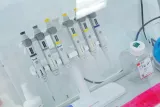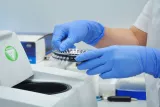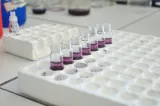Published: 14.12.2020
Bc. Alexandra Bolková completed her bachelor’s degree in Special Chemical and Biological Programmes, field of study Clinical Biology and Chemistry at the Department of Biological and Biochemical Sciences, Faculty of Chemical Technology. Currently she continues in her follow-up master’s degree in the field of study Bioanalyst. In the fight against the spreading of the coronavirus she joined as a volunteer at the Pardubice Hospital. We asked her a few questions.
Can you tell us how your volunteering began?
In mid-October, I signed up as a volunteer at the Pardubice Hospital. I completed a short questionnaire and after less than two weeks they called me from the HR Department. The next day I signed a work contract and had a training in work safety. The following day, I started working at one of the wards.
How exactly did you help?
I was in the position of a “healthcare worker” at the Intensive Care Unit at the Neurology Ward which is called ARO COVID 3. I am currently a student of the second year of the follow-up master’s degree Bioanalyst, so I hoped that they would place me in a laboratory where I could finally use my university education in practice. But they need help in usual wards, in direct contact with patients, so I worked as a hospital attendant in 12-hour day shifts. At that time, there was a much greater demand for nursing professions rather than laboratory assistants. I think after a short training this can be done by almost everybody.
Can you give more details about what you did at the hospital?
I took care of patients with a positive COVID-19 test, including manipulation with patients, serving food and drinks, bed care, transport, surface disinfection, replenishing consumables and disposable items, etc. As hospital attendants we always tried to be at hand and helped the nurses.
How did you cope with using all the protective equipment?
The ward was divided into the so-called “clean” zone and “dirty” zone, where patients were located in special boxes. So, the time we spent in protective equipment and suits was not that long (usually about an hour or two 2 or 3 times a day as needed). We weren’t in protective suits all day long.
What do you think was the greatest risk about this job?
I think it was a sort of “fear”, not in my family but some of my friends considered me to be a potential “threat” and limited their contact with me for a certain period of time. But at the hospital we protected ourselves much more than some people do on their way to the shops or in public transport. Outside the patient boxes we worked in respirators and regularly disinfected our hands. After all, serving in the first line required strong nerves and a great responsibility.
How did you cope with the fact that some patients were seriously ill?
The sad reality of this work is that most patients who were intubated and on mechanical ventilation did not have a good prognosis. However, it was important to accept this fact and make every effort to care for them. There were three hospital attendants at the ward (normally there is just one), so the work was evenly distributed and everything was smooth. The nurses were helped by colleagues from other departments. At our ward I saw dentists, orthopaedists, physiotherapists or even doctors who worked as nurses. Thanks to the great job of the ward nurse the work was well-organized and everything worked for the benefit of the whole team.
What does helping others mean to your life?
I’m glad that I had the opportunity to try out this work myself and that I collected valuable experience for practical life. I’ve realized that the position of a hospital attendant, which is a lower healthcare position, is extremely important for the functioning of each ward and the whole hospital and I’ve learned to look at this work with great humility and deep respect.
Mgr. Lucie Stříbrná, Ph.D.
Vice-Dean of the Faculty




